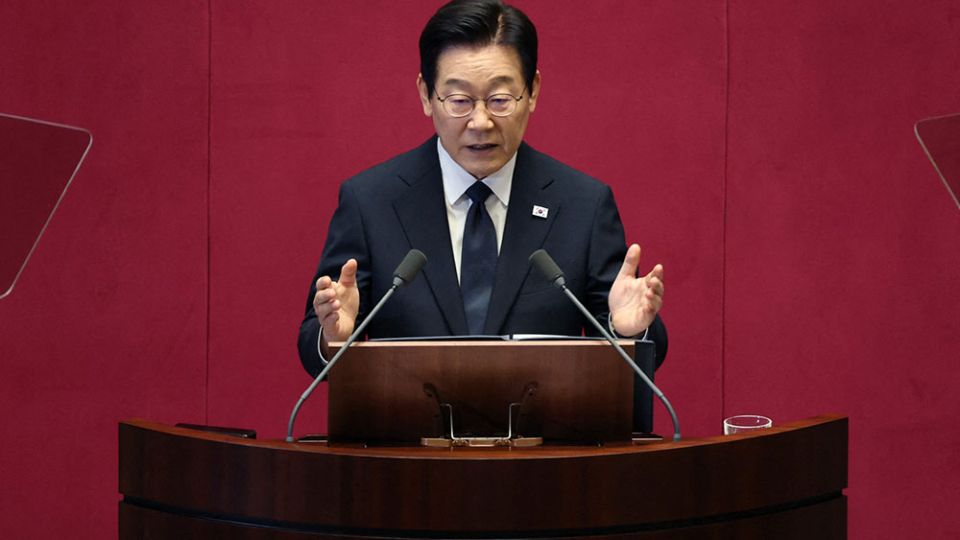November 25, 2025
SEOUL – President Lee Jae Myung emphasized the importance of persistent efforts to hold dialogue with North Korea amid a “very dangerous” state of inter-Korean relations, asserting Seoul has no intention of seeking unification by absorption.
When asked whether the South would consider scaling down joint military drills to ease tension, Lee noted that while it was difficult to predict the future, if a peace regime were established, it would be appropriate to stop the exercises.
Speaking to reporters on the presidential plane bound for Ankara, Turkey, on Monday, Lee said that although inter-Korean relations have deteriorated and trust between the two Koreas has dissipated, Seoul must continue to seek dialogue.
“It is a very dangerous situation in which an unplanned clash could happen at any time,” Lee said. He added that Pyongyang lacks “the most basic trust” and has taken extreme actions, citing the North reinforcing fences along the Military Demarcation Line.
Referring to Seoul’s offer of military talks last week, Lee said that the South must “continue to show goodwill” and try to engage in dialogue. Seoul’s Ministry of National Defense issued a statement calling for military talks to discuss matters regarding the Military Demarcation Line to prevent unintended violations and clashes. The North has so far remained silent on the matter.
Mentioning past conservative administrations that he said unnecessarily provoked the North, Lee noted that the South does not hope for a unification via absorption.
“We have no intention to unify through absorption. We are suggesting we first talk with the North, establish peaceful coexistence and then discuss (unification),” he said.
“Once a peace regime is firmly established between the South and North, it would be advisable not to hold military drills. In the long run, Korea must be responsible for its defense,” Lee said while answering questions regarding the Korea-US joint military drills. He remained cautious and stressed that inter-Korean relations are currently too unpredictable.
“There are talks of us (South) first scaling down, or postponing (joint) drills, but right now it is difficult to predict which way (inter-Korean relations) will develop,” Lee said.
“Depending on the situation, (the adjustment of the drills) could either be the outcome or leverage (of establishing a peace regime). … It is difficult to say which right now.”
Lee’s comments followed his attendance at the G20 Summit in Johannesburg, South Africa, on the sidelines of which he met with Chinese and Japanese leaders to discuss bilateral relations.
Aboard Air Force One, Lee also touched on a deepening China-Japan row during the press conference, saying that these were part of the discussion during his meeting with Chinese Premier Li Qiang and Japanese Prime Minister Sanae Takaichi on the sidelines of the G20 Summit in Johannesburg on Sunday.
In the meetings, Lee stressed the importance of Seoul’s relations with both Tokyo and Beijing, reiterating points raised in previous meetings with Takaichi and Chinese President Xi Jinping.
According to the presidential office, Lee and Takaichi emphasized their commitment to “shuttle diplomacy” and their future-oriented cooperation in the economy, security and other areas.
This is their second meeting in as many months, having sat down for talks on Oct. 30 on the occasion of the Asia-Pacific Economic Cooperation meetings held in Gyeongju, North Gyeongsang Province.
The meeting with Takaichi was followed by talks with the Chinese premier. The two acknowledged the restoration of bilateral ties following the Lee-Xi summit on Nov. 1, also during the APEC meeting.
During his meeting with Li, Lee expressed his willingness to visit Beijing and meet with Xi in the near future, while stressing continued communication to improve bilateral trust, according to Lee’s office.
Lee told reporters that he “faithfully explained South Korea’s basic position” on the two countries’ dispute during his respective meetings with Takaichi and Li.
“Although China and Japan are engaged in a conflict over the Japanese Prime Minister’s remarks, South Korea should calmly observe the current situation and do our utmost … to leave our national interest unharmed,” Lee said. “I tried to conduct a careful consultation to prevent misinterpretation. Currently, there are no significant threats or conflicts arising from South Korea’s standpoint.”
On Nov. 7, Takaichi said in a parliamentary meeting that a contingency in Taiwan could be deemed “a survival-threatening situation” for Tokyo, which is a legal term describing the grounds for activation of the Japanese Self-Defense Forces.
The remarks set off strong reactions from China, with Beijing taking the matter to the United Nations over the weekend and accusing Tokyo of threatening military intervention.


